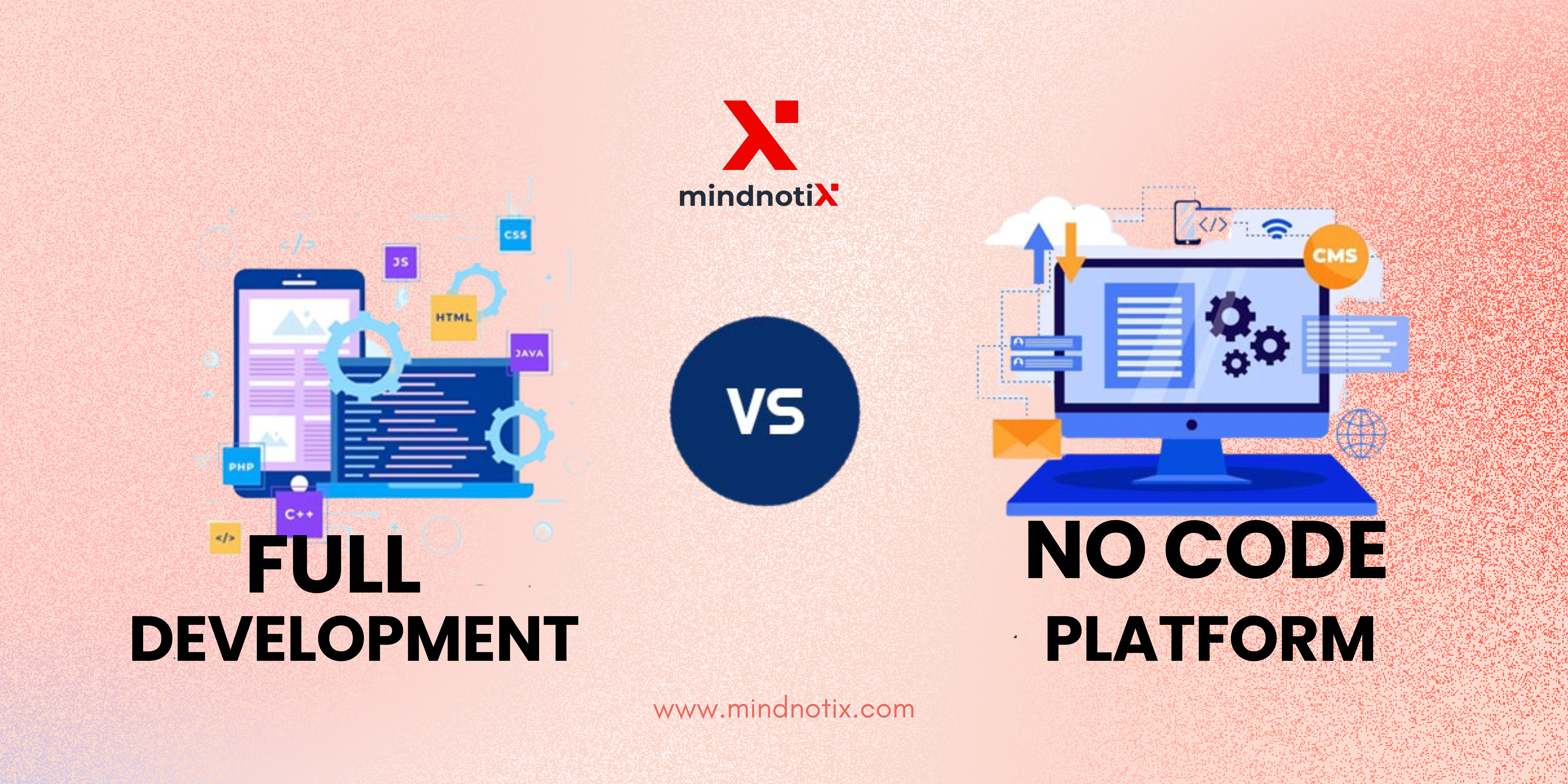Dreaming of launching a mobile app but stuck between the allure of no-code and the power of full development? You're not alone. This guide will cut through the jargon and help you choose the development service that catapults your app idea from concept to reality. Get ready to discover the citizen developer hero within you, or unleash the coding wizard for a bespoke masterpiece. We'll navigate the complexities of each approach, from cost considerations and development speed to design control and future flexibility. So, buckle up and get ready to choose the path that leads your mobile app to success!
No-Code: Perfecting the MVP for Early User Feedback
Mobile app development, the race to market is often fierce. But before pouring resources into a full-fledged app, consider the strategic power of a Minimum Viable Product (MVP) built with a no-code platform.
No-code development shines in the MVP stage. Its drag-and-drop interface and pre-built features allow you to quickly assemble a functional prototype that captures the core essence of your app. This MVP acts as a springboard for gathering invaluable early user feedback. Imagine: you can get your app into the hands of real users within weeks, not months.
Here's where the magic happens. Early users will interact with your no-code MVP, providing crucial insights into what works, what confuses them, and what features resonate most. This feedback becomes your golden ticket. You can refine your app concept, identify potential roadblocks, and iterate on your design before investing significant time and money into full development.
By leveraging the speed and affordability of no-code, you can validate your app idea, identify any major flaws, and ensure you're building something users truly need before diving into the deep end of full development. It's like testing the waters before committing to a cannonball.
Full Development: Building for Scalability and Long-Term User Needs
Future-Proofing Your App: Imagine a thriving user base putting a strain on your app's performance. With full development, you have complete control over the app's architecture. This allows you to build in scalability from the ground up, ensuring your app can smoothly handle an influx of users and ever-growing data demands.
Unleashing Feature Flexibility: Full development empowers you to create intricate features and functionalities that simply aren't possible with no-code limitations. Need a one-of-a-kind payment system or a complex social network integration? Full development grants you the freedom to bring your unique vision to life.
Performance Powerhouse: No-code platforms can sometimes struggle with complex tasks. Full development, on the other hand, allows for meticulous optimization. You have complete control over the code, enabling you to fine-tune performance for a seamless user experience even under heavy loads.
Owning Your Destiny: With full development, you have complete ownership of your app's codebase. This means you control every aspect of maintenance, updates, and future iterations. Need to integrate with a new platform or adapt to changing user needs? Full development gives you the agility to adapt and evolve your app over time.
However, full development isn't without its considerations. It requires a team of skilled developers, leading to potentially higher costs and longer development times compared to no-code solutions. It's also important to factor in the ongoing maintenance responsibilities that come with owning the codebase.
No-Code: Ideal for Streamlined Functionality and Common Features
Pre-Built Blocks for Common Features: No-code platforms come stocked with a treasure trove of pre-built components and features. Think login systems, user profiles, push notifications, and in-app purchases - functionalities that are fundamental to many mobile apps. These pre-built features save you time and effort, allowing you to focus on crafting the unique aspects of your app.
Focus on Core Value Proposition: By leveraging pre-existing functionalities, no-code development frees you from getting bogged down in the weeds. You can concentrate on what truly matters - developing your app's core value proposition and the features that set it apart.
Fast Iteration and Refinement: The beauty of no-code lies in its iterative nature. With drag-and-drop simplicity, you can quickly experiment with different layouts, functionalities, and user flows. This allows you to refine your app's core functionalities efficiently, ensuring a streamlined and user-friendly experience.
Cost-Effective Approach: Compared to full development, building with no-code is often a more budget-friendly option. Since you're not paying for custom coding, the upfront costs are typically lower. This makes no-code ideal for startups, solo entrepreneurs, or anyone with a limited budget looking to bring their app idea to life.
However, it's important to remember that no-code has limitations. The pre-built features might not cater to every niche functionality, and extensive customization can be restricted. For apps with highly specialized needs or a heavily customized user interface, full development might be a better choice.
Full Development: Taking on Complex Integrations and Unique Functionality
Unleashing the Power of Integrations: The world of mobile apps thrives on collaboration. Imagine seamlessly integrating your app with a payment gateway like Stripe, a social media platform like Facebook, or even an Internet of Things (IoT) device. Full development grants you the freedom to craft intricate integrations that connect your app to a vast ecosystem of functionalities.
Building Bespoke Functionality: No-code platforms might struggle with features that haven't been pre-built. But with full development, the sky's limit. Need a groundbreaking AI-powered recommendation engine or a one-of-a-kind augmented reality experience? Skilled developers can craft unique functionalities that set your app apart from the crowd.
Pixel-Perfect Design Control: No-code platforms often come with design limitations. Full development, however, empowers you to meticulously design every aspect of your app's user interface (UI) and user experience (UX). This allows for pixel-perfect control, ensuring your app looks and feels exactly the way you envisioned.
Performance Optimization for Demanding Apps: Complex apps with heavy data processing or intricate functionalities can push no-code platforms to their limits. Full development offers complete control over the codebase. This allows developers to optimize performance for even the most demanding applications, ensuring a smooth and responsive user experience.
The power of full development comes with responsibility. This approach typically requires a team of skilled developers, translating to potentially higher costs and longer development times compared to no-code solutions.
No-Code: Choosing from Pre-Built Templates for a Quick Launch
No-code development platforms understand this, offering a secret weapon for rapid app creation: pre-built templates.
Hitting the Ground Running: Pre-built templates act as pre-designed blueprints for your app. These templates often encompass common layouts, features, and functionalities, providing a solid foundation to jumpstart your development process. Imagine having a pre-built login screen, user profile section, or even basic navigation structure.
Focus on Customization, Not Creation: Templates free you from building everything from scratch. Instead, you can focus on customizing the pre-built elements to match your brand identity and app's specific needs. Think changing colors, adding logos, and adjusting functionalities - a much faster process than building everything from the ground up.
Reduced Learning Curve: No-code platforms boast user-friendly interfaces, but starting with a template can further simplify the learning process. Templates provide a visual reference point and a pre-defined structure, allowing you to grasp the platform's functionalities and navigate the development process intuitively.
Faster Time to Market: The beauty of templates lies in their ability to accelerate your app's journey to market. By leveraging pre-built elements, you can significantly reduce development time compared to starting with a blank canvas. This allows you to get your app in front of users faster, gather valuable feedback, and iterate quickly.
However, it's important to understand that templates have limitations. They might not perfectly match your unique vision, and extensive customization options might be restricted.
Full Development: Pixel-Perfect Design Control for a Standout App
In the competitive world of mobile apps, standing out from the crowd is paramount. Full development empowers you to achieve just that, by granting you pixel-perfect control over your app's design.
Crafting a Cohesive Brand Experience: A pixel-perfect design goes beyond aesthetics. It's about weaving your brand identity into every aspect of the user interface (UI). With full development, you have complete control over every element, from color palettes and typography to button styles and animation sequences. This allows you to create a seamless and cohesive brand experience that resonates with your target audience.
Optimizing User Experience (UX) Through Design: A well-designed app isn't just about beauty; it's about intuitive functionality. Full development grants you the power to meticulously design user flows, interaction patterns, and element placement. This level of control allows you to craft a user experience that is not only visually pleasing but also incredibly intuitive and efficient.
Pushing Design Boundaries with Custom Elements: Pre-built templates and limited design options are a thing of the past with full development. Skilled designers and developers can create entirely custom UI elements that perfectly align with your vision. Imagine crafting a one-of-a-kind navigation bar, a groundbreaking animation sequence, or a completely unique layout - the possibilities are endless.
Future-Proofing for Design Trends: The design landscape constantly evolves. Full development allows you to stay ahead of the curve by incorporating the latest design trends seamlessly. Need to integrate a trendy micro-interaction or a cutting-edge animation effect? Skilled developers can make it happen, ensuring your app remains visually relevant and engaging for users.
Full development often requires a team of experienced designers and developers, leading to potentially higher costs compared to no-code solutions. Additionally, maintaining a pixel-perfect design throughout the app's lifecycle becomes an ongoing commitment.
No-Code: Platform Updates Ensure Smooth Sailing
In the ever-evolving world of technology, keeping your app afloat requires constant adaptation. No-code development platforms understand this, offering a compelling advantage: automatic platform updates.
Staying Ahead of Security Threats: Cybersecurity is a constant battleground. No-code platforms prioritize user safety by regularly releasing updates that patch vulnerabilities and address security risks. These updates happen automatically, ensuring your app remains protected against the latest cyber threats, even if you don't possess extensive coding knowledge.
Enhanced Functionality and Features: No-code platforms are constantly evolving, adding new features and functionalities to their offerings. These platform updates can often translate to immediate benefits for your app. Imagine gaining access to a new payment integration option, a more sophisticated data visualization tool, or improved push notification functionalities - all without having to rewrite any code.
Improved Performance and Bug Fixes: No platform is perfect, and no-code platforms are no exception. However, regular platform updates often address bugs, optimize performance, and improve the overall stability of the platform. This translates to a smoother user experience for your app's users and minimizes the risk of frustrating crashes or glitches.
Reduced Maintenance Burden: One of the key benefits of no-code is its low maintenance burden. Automatic platform updates eliminate the need for you to constantly monitor and address underlying code issues. This frees you to focus on more strategic aspects of your app, such as user acquisition and marketing efforts.
Full Development: Owning the Code Means Owning Maintenance
In the realm of mobile app development, full development grants you ultimate control over your app's functionality and design. But this freedom comes hand-in-hand with a significant responsibility: ongoing maintenance. Here's a breakdown of what owning the code means for your app's upkeep:
The Burden of Bug Fixes and Security Patches: No app is perfect, and even the most meticulous development process can't eliminate the possibility of bugs or security vulnerabilities emerging over time. With full development, the responsibility to identify, fix, and patch these issues falls squarely on your shoulders.
Keeping Pace with Platform Updates: The mobile landscape is constantly evolving, with operating systems like iOS and Android releasing regular updates. These updates can sometimes introduce compatibility issues with existing apps. Full development ownership means ensuring your app adapts seamlessly to these changes, requiring ongoing vigilance and potential code adjustments.
The Ever-Present Need for Feature Updates: The key to a successful app lies in its ability to adapt and evolve. New features, functionalities, and integrations are crucial for keeping users engaged and attracting new ones. With full development, the onus falls on you to plan, develop, and implement these feature updates, ensuring your app remains fresh and competitive.
No-Code: Drag, Drop, and Deploy - Citizen Developers Rejoice!
Drag, Drop, and Deploy: Imagine building an app like assembling colorful building blocks. No-code platforms boast intuitive interfaces that let you visually drag and drop pre-built features to create your app's functionality. No coding knowledge required - just your creativity and a dash of entrepreneurial spirit!
Citizen Developers Unite! You don't need a computer science degree to be an app developer anymore. No-code empowers citizen developers - those with little to no coding experience - to bring their app ideas to life. This opens a world of possibilities for entrepreneurs, solopreneurs, and anyone with a brilliant mobile app concept.
Rapid Prototyping for Early Validation: The beauty of no-code lies in its speed. You can quickly prototype your app, get it into the hands of real users, and gather invaluable feedback early on. This rapid iteration cycle allows you to refine your concept and ensure you're building something users truly need before diving deeper into development.
Full Development: Coding Skills Required - Prepare for a Development Journey
Coding Proficiency is the Key: Full development isn't for the faint of heart. This approach demands a strong foundation in programming languages like Java, Swift, or Kotlin. If you're a coding wizard, then full development empowers you to craft intricate functionalities and bring your unique vision to life line by line.
Assemble Your Development Team: Building a complex app often requires a village, or at least a skilled development team. This team might consist of programmers, designers, testers, and project managers, all working in concert to translate your vision into a functional and beautiful app.
The Development Marathon Begins: Full development is an investment in time. Crafting a robust app from scratch takes meticulous planning, coding, testing, and refinement. Be prepared for a development journey that might take weeks, months, or even longer depending on the app's complexity.
Conclusion:
Consider your app's complexity, budget, and development expertise. If speed and affordability are paramount, and your vision aligns with common app features, no-code offers a compelling path. But for those demanding ultimate control, intricate functionalities, and a long-term vision, full development equips you with the tools to build a truly groundbreaking mobile app. Ultimately, the right choice empowers you to transform your app idea into a reality that will captivate users and propel your mobile venture forward.
Read more :
Building the Perfect App for Startups: A Guide to Mobile App Development Services
Taking Your Enterprise Mobile: How App Development Services Can Empower Your Business
For more information contact : support@mindnotix.com
Mindnotix Software Development Company


 AI-Taxi App
AI-Taxi App AI-Food App
AI-Food App AI-Property Mgmt App
AI-Property Mgmt App AI-CRM
AI-CRM AI-Fantasy App
AI-Fantasy App
 Web Development
Web Development App Development
App Development Business & Startup
Business & Startup Hire Developer
Hire Developer
 Digital Marketing
Digital Marketing Lead-generation
Lead-generation Creative Agency
Creative Agency Branding Agency
Branding Agency Augmented Reality
Augmented Reality Virtual Reality
Virtual Reality Internet of Things
Internet of Things Artificial Intelligence
Artificial Intelligence Blockchain
Blockchain Chatbot
Chatbot



